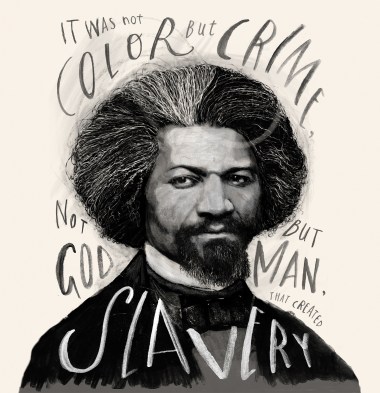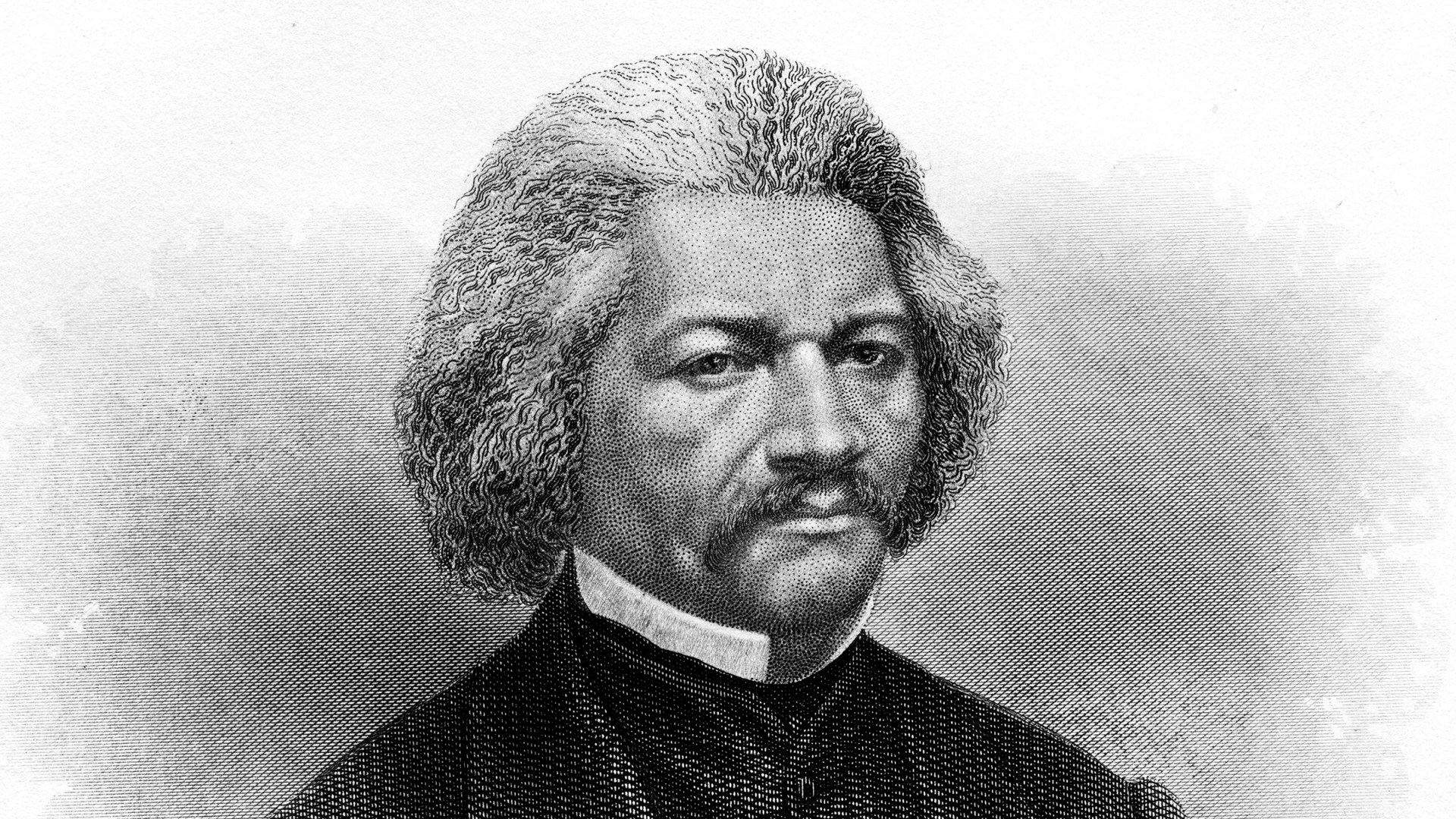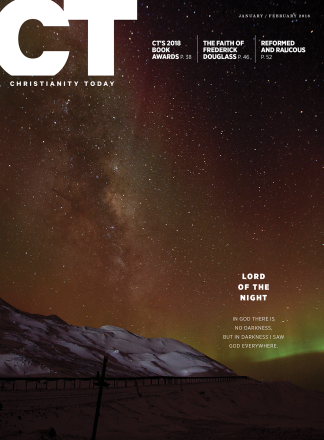As Frederick Douglass looked out on the boisterous crowd that had gathered to celebrate America’s independence, he thought of Psalm 137.
By the rivers of Babylon we sat and wept
when we remembered Zion.
There on the poplars
we hung our harps,
for there our captors asked us for songs,
our tormentors demanded songs of joy;
they said, “Sing us one of the songs of Zion!”
How can we sing the songs of the Lord
while in a foreign land? (v. 1–4)
The Rochester Ladies’ Anti-Slavery Society had invited Douglass to deliver the keynote address for their Fourth of July celebrations in 1852. Fourteen summers earlier, Douglass had escaped from slavery. Now, at only 34, he was America’s most famous abolitionist orator.
Douglass usually felt a certain anger and sadness on the Fourth of July. That day, as he stood behind the speaker’s lectern, he felt like an Israelite in exile called upon to sing for his Babylonian captors.
The crowd wanted him to venerate the Founding Fathers and celebrate their heroic deeds. At the start of his speech, Douglass seemed happy to oblige. But those who listened closely might have shifted uneasily in their seats if they noticed how Douglass used the word your. He spoke of your independence, your freedom, your nation, your fathers. The Founders succeeded in creating a new nation, Douglass said, “and today you reap the fruits of their success.”

To the slave, Douglass told his white audience, “your celebration is a sham; your boasted liberty, an unholy license; your national greatness, swelling vanity; your sounds of rejoicing are empty and heartless; your shouts of liberty and equality, hollow mock; your prayers and hymns, your sermons and thanksgivings, with all your religious parade and solemnity, are to him mere bombast, fraud, deception, impiety, and hypocrisy—a thin veil to cover up crimes which would disgrace a nation of savages.”
He reserved his harshest judgment for the nation’s churches. Nearly every white Christian either defended slaveholding or refused to speak against it. Douglass ridiculed their pretensions to righteousness with a warning from Isaiah: “And when ye spread forth your hands, I will hide mine eyes from you: yea, when ye make many prayers, I will not hear: your hands are full of blood” (1:15, KJV).
Forgotten Prophet
February marks the 200th anniversary of the birth of Frederick Douglass. Born a slave on the Eastern Shore of Maryland, Douglass fled to freedom in 1838 and became a champion of liberty and equality.
In his 77 years, Douglass delivered thousands of speeches. He published three autobiographies. He founded and edited newspapers. He attended the first great women’s rights convention, in Seneca Falls, New York, in 1848. He met with President Abraham Lincoln to lobby for emancipation. He championed the cause of African American civil and political equality after the Civil War. He lived to see the tragic onset of Jim Crow and fought the oppressive system of racial segregation, disenfranchisement, and violence until he died in 1895 (a year before the notorious Supreme Court decision Plessy v. Ferguson, which upheld segregation under the “separate but equal” doctrine).
Yet there’s a side of Douglass that’s not often remembered or celebrated: his radical Christian faith. Douglass was a kind of prophet crying in the wilderness of Christian slaveholding America. It’s no coincidence that in the most famous speech of his life—“What to the Slave is the Fourth of July?”—Douglass quoted the prophet Isaiah at length. He aspired to speak to America as biblical prophets once spoke to their people: with words of warning and rebuke, grace and hope.
Old Testament scholar Walter Brueggemann has written that ancient Hebrew prophets “nurture, nourish, and evoke a consciousness and perception alternative to the consciousness and perception of the dominant culture.” They offer “an alternative perception of reality,” one that allows people to “see their own history in the light of God’s freedom and his will for justice.”
Douglass tried to do the same thing in his long struggle against bondage. Slavery, as an elaborate system of racial oppression, offered a flawed “perception of reality,” a poisonous account of who we are as human beings and how we ought to live together. Douglass spent a lifetime pleading with white Christians, as members of the dominant culture, to acknowledge how thoroughly slavery had distorted their view of reality and kept them from loving as Christ loves.
He had no illusions about the possibility of eradicating all evil and fully realizing the kingdom of God on earth. But, in hopeful anticipation of a world without slavery, the prophetic Douglass implored his fellow Christians to hew to the narrow path of doing justice, loving mercy, and walking humbly with God.
‘Not Color, but Crime’
The crucible of Douglass’s prophetic Christian faith was his childhood suffering as a slave. Before his escape at age 20, Douglass witnessed and endured great cruelty, especially at the hands of Christian masters.
Young Douglass spent most of his earliest childhood days on the sprawling plantation of the Lloyd family, one of Maryland’s wealthiest slaveholders. There, Douglass first saw the grotesque violence and depravity that accompanied slavery: brutal whippings, cold-blooded murder, the daily trials of physical and psychological abuse.
Early one morning, Douglass woke to the desperate cries of his aunt Hester. A 15-year-old girl of striking beauty, Hester had been courted by Ned Roberts, a Lloyd family slave. Aaron Anthony, the slavemaster, commanded Hester to stop visiting Ned, but she continued, which incited Anthony’s rage. When Douglass peered out of his bedroom, a closet in the Anthony kitchen, he saw Hester stripped to the waist, her wrists bound together and fastened to the ceiling above her head. Anthony cursed Hester as he methodically delivered blow after blow with his three-foot-long cowskin whip. Blood flowed down her back as she pleaded for mercy. Douglass watched in terrified silence as Anthony delivered 30 or 40 lashes, before untying Hester and letting her body fall bloody and exposed on the kitchen floor.
How is a child, no more than six or seven, supposed to make sense of such violence? Douglass was a bright boy, so he soon asked the hardest questions: Why am I a slave? Why must slaves like Hester endure such pain, even unto death? Where is God? Why is he silent in our suffering?
Douglass suspected that the answers he heard from white southern Christians could not be right. How could God, in perfect wisdom and goodness, have made black people to be slaves and white people to be masters? Perhaps, he thought, it “was not color, but crime, not God, but man” that created slavery.
In 1826, Douglass was sent to Baltimore to live with Hugh and Sophia Auld. Late one Sunday night, he woke to the sound of Sophia, a devout Methodist, reading from the first chapter of the Book of Job. Douglass heard about a man who feared God and eschewed evil yet still lost everything—his livestock, servants, and children. Half-awake under a table on the Auld floor, Douglass decided he had to know more about this man Job—how he could say, despite his suffering, “blessed be the name of the Lord.”
Sophia began to teach Douglass the alphabet, but Hugh forbade the lessons. So Douglass secretly taught himself, laboring over well-worn and well-hidden copies of Webster’s spelling book and Methodist hymnals. By the time he was 13 or 14, he could capably read and write. Soon after, he formally converted to Christianity, shepherded by free black Methodists. Within the African Methodist Episcopal Church, Douglass first learned that there might be more to the call of Christ than the proslavery gospel he had heard his entire life.
Salvation, though, came slowly. For several weeks, tortured by the knowledge of his sin, Douglass remained “a poor, broken-hearted mourner, traveling through the darkness and misery of doubts and fear.” But once he cast all his cares upon God, Douglass wrote, he found faith in Christ as “Redeemer, Friend, and Savior.”
Not long after, in March 1833, Hugh Auld unexpectedly sent Douglass back to the Eastern Shore. For the next three years, Douglass labored for the first time as a field hand, physically and spiritually exhausting work. During this time, he saw just how completely slaveholders distorted the Christian faith to justify their violence and oppression. His most outwardly religious masters were the most depraved in their cruelty.
On Sabbath mornings, Douglass often stood on the banks of the Chesapeake Bay and gazed upon the white sails of vessels that traveled the globe untrammeled. The sight tormented him. One Sabbath, in his misery, with no audience but God, he cried out a psalm of lament: “O, why was I born a man, of whom to make a brute! The glad ship is gone; she hides in the dim distance. I am left in the hottest hell of unending slavery. O God, save me! God, deliver me! Let me be free! Is there any God? Why am I a slave?”
In his brokenness, comfort slowly came. Douglass’s sorrow that morning transformed into hope for deliverance. He felt God’s presence and resolved on the banks to do his part to win his freedom: “I will run away. . . . God helping me, I will. It cannot be that I shall live and die a slave.”
Douglass took few possessions on his long journey to freedom. He left behind his chains, but not his prophetic Christian faith that first took root in slavery. At the foundation of that faith rested certain assurances: that God suffers with the oppressed and will not tolerate injustice forever; that slaveholders perverted the Christian faith in their religious justifications of oppression; that Christ, in bidding all to come and die, offers a new way to live, radically different from the world’s hatred and violence.
‘The Christianity of Christ’
Douglass would settle in New Bedford, Massachusetts, hoping only to earn a fair wage as a caulker. But he soon gravitated toward the abolitionist movement. He avidly read William Lloyd Garrison’s Liberator, the nation’s leading antislavery newspaper, which “took its place with me next to the Bible,” Douglass wrote, because of its bold condemnation of “hypocrisy and wickedness in high places.”
In 1841, Douglass became a paid lecturer of the Massachusetts Anti-Slavery Society. The society’s president offered Douglass the job after hearing him make an impromptu speech at an abolitionist rally. Douglass would now make a living traveling through the North, telling the story of his life and denouncing slavery and its defenders. His task was to convince Americans to see the antislavery cause as a great moral necessity. To that end, he repeated a chastening refrain: “Between the Christianity of this land, and the Christianity of Christ, I recognize the widest possible difference.”
Douglass delivered this message to greatest effect in his first autobiography, the iconic Narrative of the Life of Frederick Douglass, an American Slave. Published in 1845, the book was an instant hit, selling 30,000 copies within five years. Douglass’s Narrative is one of the great texts of the black prophetic Christian tradition, full of scorn for religious hypocrisy and oppression but also full of hope that Americans might still commit themselves to the path of true righteousness.
In the famous “Appendix,” Douglass condemned the “corrupt, slaveholding, women-whipping, cradle-plundering, partial and hypocritical Christianity” everywhere present in America. As Douglass knew from direct experience, the cruelest slaveholders were also often the most ardent churchgoers. “The man who wields the blood-clotted cowskin during the week fills the pulpit on Sunday,” Douglass scoffed, “and claims to be a minister of the meek and lowly Jesus.”
But the tragedy went deeper than the fact that individual slaveholders professed Christianity while failing to live up to Christ’s commands. Every believer shared that failure. Far worse was how, at an institutional level, slavery and the Christian church—in the North and South—remained inextricably connected. “The slave auctioneer’s bell and the church-going bell chime in with each other, and the bitter cries of the heart-broken slave are drowned in the religious shouts of his pious master,” Douglass lamented. The slaveholder fills church coffers with gold, and, in turn, the pastor “covers his infernal business with the garb of Christianity.”
Douglass then quoted from Matthew 23, where Jesus Christ calls the scribes and Pharisees “whited sepulchers, which indeed appear beautiful outward, but are within full of dead men’s bones, and of all uncleanness” (v. 27, KJV). Douglass insisted that Christ’s words held true for “the overwhelming mass of professed Christians in America.” Slaveholders and their apologists “attend with Pharisaical strictness to the outward forms of religion, and at the same time neglect the weightier matters of the law, judgment, mercy, and faith.” They had utterly abandoned the true Christianity of Christ and invited the wrath of a just and avenging God.
Hope of Redemption
Douglass rejoiced in 1865 when the Union triumphed in the Civil War and the nation ratified the Thirteenth Amendment, abolishing slavery forever. But he did not believe his prophetic work had ended. At the end of his life, equality under the law remained an aspiration, not a reality. African Americans and women were denied the right to vote. The ghost of slavery lived on in oppressive economic arrangements like sharecropping. Jim Crow carved rigid lines of racial segregation in the public square. White mobs lynched at least 200 black men each year in the 1890s.
He had good reason, then, in 1889, to mourn how the “malignant prejudice of race” still “poisoned the fountains of justice, and defiled the altars of religion” in America. Yet Douglass also rejoiced in the continued possibility of redemption. A new way of seeing the world, and living in it, still remained—one that rested, Douglass said, on a “broad foundation laid by the Bible itself, that God has made of one blood all nations of men to dwell on all the face of the earth.”
In these unsettled times, it’s only natural to want to summon Douglass from the grave—to have him speak directly to the particular problems that still fester at the intersection of race and religion in American life.
That desire reminds me of a story about a great 20th-century American historian, Don Fehrenbacher. As the story goes, he once was lecturing in Boston during the mounting crisis over forced busing to integrate public schools. After his talk, a man asked, “What would Abraham Lincoln say about busing?” Fehrenbacher replied: “I think he would probably say, ‘What’s a bus?’ ”
Douglass’s America is not our America. A chasm of historical change separates us, much of it nearly unimaginable when Douglass died. And yet, we’re still heirs of the history Douglass faced and forged. The “malignant prejudice of race” lives on, a mockery of our common Creator and the likeness of the God we share.
If he could stand before us today, I doubt Douglass would presume to offer simple solutions to our racial dilemmas. But I suspect he would remind us of the promise made in Isaiah: “Cease to do evil; learn to do well; seek judgment, relieve the oppressed, judge the fatherless, plead for the widow. Come now, and let us reason together, saith the Lord: though your sins be as scarlet, they shall be as white as snow” (1:16–18, KJV).
D. H. Dilbeck is a historian living in New Haven, Connecticut. This article is adapted from his book, Frederick Douglass: America’s Prophet (The University of North Carolina Press).
Have something to say about this topic? Let us know here .











